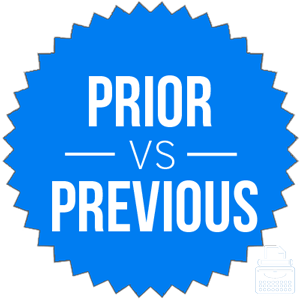Example sentences previous visit
In fact, my only previous visit was in 2010 under my own name and passport.
He won on his only previous visit here.
Whatever, this was as uneventful as their previous visit was astounding.
To my surprise my taste buds realised it was not the same as on my previous visit , 20 years earlier.
On a previous visit we saw its donut-maker break down.

Definition of 'previous' previous

Definition of 'visit' visit

COBUILD Collocations previous visit
Browse alphabetically previous visit
- previous to
- previous tournament
- previous version
- previous visit
- previous week
- previous winner
- previous year
- All ENGLISH words that begin with 'P'
Quick word challenge
Quiz Review
Score: 0 / 5
Wordle Helper

Scrabble Tools

Prior vs. Previous – What’s the Difference?
Home » Prior vs. Previous – What’s the Difference?
When two words are synonyms, how do you choose which one to use?
Very rarely are two words completely interchangeable, but in those circumstances, your best bet is to consider the overall fluidity of your sentence. In some cases, one word might seem more natural than the other in context, while its counterpart might stick out.
Is there a real difference between the words prior and previous ? Continue reading to find out.
What is the Difference Between Prior and Previous?
In this post, I will compare prior vs. previous . I will use each of these words in several example sentences, to give you an idea of how they should appear in context.
Plus, I will show you a helpful memory trick that you can use as a reminder of whether to use prior or previous.
When to Use Previous

Previous comes from the Latin word praevius , and its English form was first recorded in 1621.
Here are some more examples of previous in sentences:
- The quarterback did not rush for significant yardage with his previous team, but has carried the ball much more frequently in the new offense.
- Many television shows, especially long-running, story-heavy dramas like HBO’s Game of Thrones and AMC’s Breaking Bad, open with a montage reminding viewers of the events of previous episodes.
- Hanging over everything was Russia’s disastrous sixth-place finish in the medal count at the previous Winter Olympics, in Vancouver, British Columbia. – The New York Times
Previously is the related adverb , and it is sometimes a synonym of before , meaning at an earlier time .
When to Use Prior

- Moreover, the “unilateral” actions the president proposed last night are much narrower and less problematic than many of his prior actions, such as his broad immigration non-enforcement or his selective rewriting and delaying of the Affordable Care Act. – The Washington Post
According to most sources, prior and previous are interchangeable. Indeed, one could substitute prior for previous in the example sentences above without changing their meanings.
Prior , though, doesn’t have a related adverb. Some writers use the construction prior to as a synonym for before , but most language authorities scoff at its use. As Bryan Garner (2016) notes, you wouldn’t use posterior to instead of after , so you probably shouldn’t use prior to instead of before , either.
Prior also comes from Latin, where it is related to the same root as previous . Merriam Webster actually records its first use in 1607, a few years earlier than previous .
Trick to Remember the Difference: Previous vs. Prior

Previous is used a little more frequently, though, at least since 1800. If one of your goals is to make your writing as accessible as possible to a majority of readers, previous might be a better bet since it is more common.
Since previous and frequently both contain the letter E , you can easily remember that previous shows up more frequently that prior in published English.
In reality, though, you should probably just choose whichever word fits best in the context of your sentence.
Is it previous or prior? Prior and previous are two interchangeable adjectives that mean earlier .
Previous is slightly more common, but either word will work in any context.
Inpression Editing
Copy & Content That Makes Your Brand Soar
“Before” vs. “prior to”: What’s the difference?
If you’re someone who writes or creates content, there’s a dilemma you’ve probably faced: whether to use “before” vs. “prior to” in a particular sentence. For example, which one could you use here: “We considered all the evidence _____ making a decision”? Would you choose “before” or would you place your bets on “prior to”? You may be confident that you know which one fits. But do you really know the right answer?
“Before” vs. “prior to”: Which word could you use?
We’ve got good news for you: no matter which word you chose, you’re right. You can use either “before” or “prior to” in the sentence:
- “We considered all the evidence before making a decision.”
- “We considered all the evidence prior to making a decision.”
Why can you use either word? Because “before” vs. “prior to” mean the same thing. In fact, if you look up both words in major dictionaries (e.g., the Merriam-Webster Dictionary , Oxford Dictionaries , and the Collins Dictionary ), you’ll find that the definition of “prior to” is “before.” That’s why you could use either “before” or “prior to” in all these sentences:
- “Before attending law school, Janessa worked as a teacher.”
- “Prior to attending law school, Janessa worked as a teacher.”
- “They needed to finish the layout for the magazine before leaving for the day.”
- “They needed to finish the layout for the magazine prior to leaving for the day.”
- “You must let the chocolate cool before moving on to the next step.”
- “You must let the chocolate cool prior to moving on to the next step.”
“Before” vs. “prior to”: Which word should you use?
Now, just because you can use either “before” or “prior to” in any sentence doesn’t mean you should. It’s true that “before” vs. “prior to” are both grammatically correct choices for a sentence. But that doesn’t mean that they’re equally good choices.
If you read our posts on a regular basis, you’ll know that we like to keep things simple . That is, we always suggest using the simplest words that you can use in a sentence. Simple words make sentences easier to read and understand, and your number one job as a writer is to make your reader’s job as easy as possible. That’s why we believe “before” is always a better choice than “prior to.”
We know what some of you are thinking: “‘prior to’ is a better fit for a project proposal or report because it sounds more formal.” After all, you’re probably used to seeing corporate and legal documents that are peppered with this term. In reality, though, “prior to” is just a Latin-based synonym of “before” that sounds unnecessarily formal. In fact, the Merriam-Webster dictionary notes that some people even see “prior to” as pompous. And you don’t want to seem pompous, do you?
Remember that smart people are impressed by how clearly and simply you can explain something, not by how complex your writing is. That’s why we suggest resisting the temptation to use “prior to” and going with “before” no matter what. After all, there’s really no situation where you would need to use “prior to” instead of “before.”
“Before” vs. “prior to” may feel like different words that are appropriate for different types of sentences. But the reality is that they mean the same thing. That’s why no matter what you’re trying to say, you can simplify and strengthen your writing by using “before” instead of “prior to.”
—————————————————————————————————————————————
Want more tips on how to produce clear and concise content? Read our post on how to shorten long words and sentences .
————————————————————————————————————————————— Inpression Editing helps businesses, professionals, and students make the best impression possible on customers, investors, hiring managers, and admissions committees. We do this by providing copywriting, editing, and writing coaching services for website copy, blog posts, marketing materials, personal statements, and much more.
Located in Toronto, Canada, we provide all of our services in both Canadian and US English. Get an instant quote here .
- ← 5 blog post headline mistakes you need to stop making
- 9 blog title generator tools to help you craft the perfect headline + 72 title templates →
Leave a Reply Cancel reply
Your email address will not be published. Required fields are marked *
- Skip to primary navigation
- Skip to main content
- Skip to primary sidebar
- Skip to footer
Common Errors/Mistakes in English
Visited vs Have Visited vs Had Visited: How to Use Them Correctly
7 years ago 67K Views
Common Errors in English Sentences : Using correct tense an important part of every business communication as it reflects your personality, especially when you’re communicating with someone who is well-versed in English language.
Are you a non-native English speaker, confused between “visited vs. have visited”? This post will help you understand the grammar rules once and for all.
Using correct tense is an important part of every business communication as it reflects your personality, especially when you’re communicating with someone who is well-versed in the English language.
It’s quite common to find many non-native English users confusing “past tense” with “present perfect tense”.
So, let’s take a look at some examples below:
❎ I have visited the doctor this past week. ( wrong )
❎ Have you met your mother yesterday? ( wrong )
So, what do you think is wrong with these examples?
Explanation : This is a pretty common error in Asian countries where English communication is largely affected by their mother tongue. Many non-English languages carry grammar rules which can be very different from the grammar rules we follow in the English language.
In the English language, when you describe an event that occurs in the past, i.e. yesterday or last week, you essentially use the “past simple” tense of the verb.
In the examples above, “yesterday” and “this past week” are both “adverbs”, meaning they define the nature of the verb that precedes them.
In the first example, the speaker talks about an event (visiting the doctor) with information about its occurrence (this past week).
Please, note that the “timing of the event” (or time adverb) is of utmost importance here, which decides the “tense form” the verb must take in the sentence.
Here, “this past week” refers to an event that clearly occurred in the past. Therefore, the event itself (visiting the doctor) must take “the past simple tense”.
Hence, it would be right to express yourself in the following way.
I visited the doctor this past week.
Similarly, the correct version of the second example would be:
Did you visit your mother yesterday?
To make it even clearer for you, here’s how you should break the sentences to understand which tense they should take.
I + visited + the doctor + this past week
Visited = the “past simple tense” of the verb “visit”.
This past week = the adverb denoting “timing of the event”.
Know Your Adverbs
It’s important to know your adverbs well enough in order to form correct sentences, using the appropriate tense.
Let’s consider a few examples with different adverbs.
Now, Currently, Right Now, Today
You can use either present continuous or present perfect tense with these verbs. However, you can never use “past simple” with these.
For example, the following examples would sound plain stupid:
❎ He was unemployed currently. ( incorrect )
❎ He’s unemployed currently. ( correct )
❎ Was he sick right now? ( incorrect )
❎ Is he sick right now? ( correct )
❎ I came here today. ( incorrect )
❎ I’ve come here today. ( correct )
However, there are some “adverbs” that can take both “past tense” as well as “present perfect tense” depending on the context.
Here are Some Examples:
✅ Example #1: I have purchased a CD player recently. (present perfect tense)
✅ Example #2: I purchased that CD player recently. (past simple tense)
Oxford Dictionary defines “recently” as an adverb denoting “at a recent time” and “not long ago”.
Explanation:
In Example #1, we are using a perfect tense in order to name the action as the source of the present state. Whereas, in Example #2, we are using a past tense since the action is one of a sequence of past actions, a narrative.
Please, keep in mind the present perfect is a present tense, which makes a statement about the situation at the time of speaking.
However, the following example would be incorrect.
❎ I have purchased that CD recently.
This is because when you are talking about purchasing “that CD”, you have presumably purchased it in the past. Therefore, you should rather say, “I purchased that CD recently”.
Visited vs Had Visited
Believe it or not, many non-native English users find it hard to differentiate between past simple tense and past perfect tense. They often wonder if the two could be used interchangeably.
The truth is both these tenses offer different contexts to the event. Take a look at the following examples:
- Example #1 : I visited my doctor yesterday.
- Example #2 : I had visited my doctor yesterday.
Which of the above examples is correct?
Answer : The first one.
We use past tense when the time is specified, e.g. yesterday.
We use past perfect tense only when we refer to another event (a concurrent event) in the past. In other words, it must carry some context – “what happened after you visited the doctor yesterday?”
For example:
I had watched television yesterday when it was time to go to bed.✅ Activity in the past = “it was time”.
✅ Activity before the past = “had watched television”.
I had watched television yesterday, by the time my parents came back.
✅ Activity in the past = “my parents came back”.
In short, without any context to “the other activity” that was done after watching television, using “had watched” would be incorrect.
Therefore, if you only mean to mention “watching television” in the past, simply say, “I watched television yesterday”.
I hope this helps. Please, let me know if you have any questions.
Source : Stack Exchange and Quora
About Susanta Sahoo
I'm the founder of Common English Errors, a blog dedicated to helping people learn English grammar easily. If you want to support me, please, donate via PayPal .
I offer article writing services, SEO and WordPress services. Hire me on Upwork if you need my services.

Reader Interactions
24 reactions.
Simple and much informative
What is the difference in was visited and has-been visited /had been visited
Susanta Sahoo
Was visited (Something or someone has been visited). For example, The school was visited by the Minister of Education yesterday. While in the hospital, I was visited by many of my school mates.
Omg, this article completely provides such helpful information. I didn’t even have any idea about such grammatical errors. That’s totally detailed explanations. Thank you very much for giving us such useful information
Beimnet Teshome
thank you so helpful
Leave a Reply Cancel reply
Your email address will not be published. Required fields are marked *

- More from M-W
- To save this word, you'll need to log in. Log In
Definition of visit
(Entry 1 of 2)
transitive verb
intransitive verb
Definition of visit (Entry 2 of 2)
- call (on or upon)
- drop in (on)
Examples of visit in a Sentence
These examples are programmatically compiled from various online sources to illustrate current usage of the word 'visit.' Any opinions expressed in the examples do not represent those of Merriam-Webster or its editors. Send us feedback about these examples.
Word History
Middle English, from Anglo-French visiter , from Latin visitare , frequentative of visere to go to see, frequentative of vidēre to see
13th century, in the meaning defined at transitive sense 3d
1621, in the meaning defined at sense 1a
Phrases Containing visit
- conjugal visit
- pay a visit to
- pay (someone) a visit
- visit on / upon
Dictionary Entries Near visit
vision quest
Cite this Entry
“Visit.” Merriam-Webster.com Dictionary , Merriam-Webster, https://www.merriam-webster.com/dictionary/visit. Accessed 4 Jun. 2024.
Kids Definition
Kids definition of visit.
Kids Definition of visit (Entry 2 of 2)
Middle English visiten "to go to a person especially to give comfort," from early French visiter (same meaning), derived from Latin visere "to go to see," from vidēre "to see" — related to vision
Medical Definition
Medical definition of visit.
Medical Definition of visit (Entry 2 of 2)
More from Merriam-Webster on visit
Nglish: Translation of visit for Spanish Speakers
Britannica English: Translation of visit for Arabic Speakers
Subscribe to America's largest dictionary and get thousands more definitions and advanced search—ad free!

Can you solve 4 words at once?
Word of the day.
See Definitions and Examples »
Get Word of the Day daily email!
Popular in Grammar & Usage
More commonly misspelled words, commonly misspelled words, how to use em dashes (—), en dashes (–) , and hyphens (-), absent letters that are heard anyway, how to use accents and diacritical marks, popular in wordplay, the words of the week - may 31, pilfer: how to play and win, 9 superb owl words, 10 words for lesser-known games and sports, etymologies for every day of the week, games & quizzes.

- Skip to main content
- Keyboard shortcuts for audio player
TED Radio Hour
- Subscribe to NPR's Up First Email

Cathryn Virginia hide caption
A Love Letter To The Ocean
Oceans cover nearly 75% of the Earth. While they seem vast and frightening, they're also enchanting and whimsical. This hour, TED speakers dive into stories of connection — and even love — in the sea.

A love story... that begins with a sea urchin
by Manoush Zomorodi , Katie Monteleone , Sanaz Meshkinpour

What can we learn from the sex lives of fish?
by Manoush Zomorodi , James Delahoussaye , Sanaz Meshkinpour

Why the strange and wonderful parrot fish is in trouble
by Manoush Zomorodi , Fiona Geiran , Sanaz Meshkinpour

Could snail venom someday save your life?
by Manoush Zomorodi , Rachel Faulkner White , Sanaz Meshkinpour
- See TED Radio Hour sponsors and promo codes
IOWA Research Park

Perspective Therapeutics to Present at the Society of Nuclear Medicine and Molecular Imaging (SNMMI) Annual Meeting 2024
SEATTLE, May 20, 2024 (GLOBE NEWSWIRE) -- Perspective Therapeutics, Inc. ("Perspective" or "the Company") (NYSE AMERICAN: CATX), a radiopharmaceutical company that is pioneering advanced treatment applications for cancers throughout the body, today announced the Company will present information pertaining to the Company's sponsored studies of its assets at the Society of Nuclear Medicine & Molecular Imaging ("SNMMI") Annual Meeting 2024, which is being held in Toronto, Canada, from June 8-11, 2024. The Company notes that results based on investigator-initiated use of its assets are also being presented.
"We are greatly encouraged by the progress of our clinical and preclinical programs," said Thijs Spoor, CEO of Perspective. "The upcoming presentations at the SNMMI meeting will showcase our activities with VMT-α-NET and other promising therapies, underlining our commitment to advancing care for patients battling challenging tumor types."
[ 212 Pb]VMT-α-NET for the Treatment of Neuroendocrine Tumors The abstract describing Perspective's trial in progress of the Phase 1/2a dose escalation study (NCT05636618) in patients with unresectable or metastatic somatostatin receptor type 2 ("SSTR2")-positive neuroendocrine tumors ("NETs") who have not received prior peptide receptor radionuclide therapies ("PRRT") stated the trial's status as of January 15, 2024, consistent with the abstract submission deadline for the SNMMI conference. Updates on this trial as of March 7, 2024 were provided during the Company's investor update on March 18, 2024, accessible on the events page of the Company's website. This study, in conjunction with the Phase 0 imaging study (NCT05111509), would inform the recommended Phase 2 dose of [ 212 Pb]VMT-α-NET.
Perspective, in collaborating independent investigators, is evaluating dosimetry and the applicability of patient-specific dosing as determined by a target renal absorbed dose for [ 212 Pb]VMT-α-NET. An abstract reported pooled data from ten patients recruited in the Company's sponsored Phase 0 imaging study and an investigator sponsored absorbed dose escalation study. The investigator reported [ 212 Pb]VMT-α-NET was prescribed to three patients at individualized doses of 5.3, 7.9, and 13.3 mCi (cumulatively, delivered over two cycles) while targeting renal absorbed dose of 3.5Gy. Higher levels of targeted renal absorbed doses are in the protocol for subsequent cohorts of the investigator sponsored study.
The Company has been informed that updated results from the investigator initiated trial of [ 212 Pb]VMT-α-NET in India have been accepted for presentation by the SNMMI conference. The investigator enrolled adult patients with histologically confirmed NETs and metastatic medullary thyroid carcinomas. The investigator informed the Company that the update includes results from 12 patients at a later data cutoff date than previous presentations. The most recent prior public update by the investigator was during the 36 th Annual Congress of the European Association of Nuclear Medicine (EANM) in September 2023.
Preclinical Progress on Targeted Therapies for Melanoma and Tumor Environments
The Company will present preclinical data for [ 212 Pb]VMT01, a targeted α-particle radionuclide therapy (α-TRT) targeting the melanocortin 1 receptor ("MC1R"), used in combination with immune checkpoint inhibitors ("ICIs") in diverse murine melanoma models with high (B16-F10), mid (YUMM-D3) and low (YUMMwt) expressions of MC1R. These data provide a rationale for advancing the combination of [ 212 Pb]VMT01 and ICIs to clinical investigations. The ongoing Phase 1/2a study of [ 212 Pb]VMT01 is being amended to evaluate the safety and tolerability of Perspective's [ 212 Pb]VMT01 in combination with the ICI nivolumab in patients with histologically confirmed melanoma and MC1R-positive imaging scans.
The final presentation will introduce [ 203/212 Pb]-PSV-359, a novel cyclic peptide developed to target fibroblast activation protein alpha ("FAP"), a protein abundantly expressed by cancer-associated fibroblasts in tumor lesions and involved in promoting disease progression. [ 203/212 Pb]-PSV-359 has a proprietary targeting moiety designed by Perspective to optimize "theranostic" applications, representing a promising avenue for addressing FAP expressing cancers regardless of disease site.
About Perspective Therapeutics, Inc. Perspective Therapeutics, Inc., is a radiopharmaceutical development company that is pioneering advanced treatment applications for cancers throughout the body. The Company has proprietary technology that utilizes the alpha emitting isotope 212 Pb to deliver powerful radiation specifically to cancer cells via specialized targeting peptides. The Company is also developing complementary imaging diagnostics that incorporate the same targeting peptides, which provide the opportunity to personalize treatment and optimize patient outcomes. This "theranostic" approach enables the ability to see the specific tumor and then treat it to potentially improve efficacy and minimize toxicity.
The Company's melanoma (VMT01) and neuroendocrine tumor (VMT-α-NET) programs have entered Phase 1/2a imaging and therapy trials for the treatment of metastatic melanoma and neuroendocrine tumors at several leading academic institutions. The Company has also developed a proprietary 212 Pb generator to secure key isotopes for clinical trial and commercial operations.
For more information, please visit the Company's website at www.perspectivetherapeutics.com .
Safe Harbor Statement This press release contains forward-looking statements within the meaning of the United States Private Securities Litigation Reform Act of 1995. Statements in this press release that are not statements of historical fact are forward-looking statements. Words such as "may," "will," "should," "expect," "plan," "anticipate," "could," "intend," "target," "project," "estimate," "believe," "predict," "potential" or "continue" or the negative of these terms or other similar expressions are intended to identify forward-looking statements, though not all forward-looking statements contain these identifying words. Forward-looking statements in this press release include statements concerning, among other things, the Company's ability to pioneer advanced treatment applications for cancers throughout the body; the Company's expectation that its clinical and preclinical programs will continue to progress; the Company's belief that it will showcase its activities with VMT-α-Net and other promising therapies at the Society of Nuclear Medicine and Molecular Imaging meeting, underlining the Company's commitment to advancing care for patients battling challenging tumor types; the Company's belief that [ 203/212 Pb]-PSV-359, a novel cyclic peptide, has the ability to target fibroblast activation protein alpha, a protein abundantly expressed by cancer-associated fibroblasts in tumor lesions and involved in promoting disease progression; the Company's belief that it has designed a proprietary targeting moiety for [ 203/212 Pb]PSV359 to optimize "theranostic" applications, representing a promising avenue for addressing FAP expressing cancers regardless of disease site; the Company's prediction that complementary imaging diagnostics that incorporate certain targeting peptides provide the opportunity to personalize treatment and optimize patient outcomes; the Company's expectation that its "theranostic" approach enables the ability to see specific tumors and then treat it to potentially improve efficacy and minimize toxicity; the Company's ability to develop a proprietary 212 Pb generator to secure key isotopes for clinical trial and commercial operations; the Company's clinical development plans and the expected timing thereof; the expected timing for availability and release of data; expectations regarding the potential market opportunities for the Company's product candidates; the potential functionality, capabilities, and benefits of the Company's product candidates and the potential application of these product candidates for other disease indications; the Company's expectations, beliefs, intentions, and strategies regarding the future; the Company's intentions to improve important aspects of care in cancer treatment; and other statements that are not historical fact.
The Company may not actually achieve the plans, intentions or expectations disclosed in the forward-looking statements and you should not place undue reliance on the forward-looking statements. These forward-looking statements involve risks and uncertainties that could cause the Company's actual results to differ materially from the results described in or implied by the forward-looking statements, including, without limitation, the potential that regulatory authorities may not grant or may delay approval for the Company's product candidates; uncertainties and delays relating to the design, enrollment, completion, and results of clinical trials; unanticipated costs and expenses; pre-clinical and early clinical trials may not be indicative of the results in later clinical trials; clinical trial results may not support regulatory approval or further development in a specified indication or at all; actions or advice of regulatory authorities may affect the design, initiation, timing, continuation and/or progress of clinical trials or result in the need for additional clinical trials; the Company's ability to obtain and maintain regulatory approval for the Company's product candidates; delays, interruptions or failures in the manufacture and supply of the Company's product candidates; the size and growth potential of the markets for the Company's product candidates, and the Company's ability to service those markets; the Company's cash and cash equivalents may not be sufficient to support its operating plan for as long as anticipated; the Company's expectations, projections and estimates regarding expenses, future revenue, capital requirements, and the availability of and the need for additional financing; the Company's ability to obtain additional funding to support its clinical development programs; the availability or potential availability of alternative products or treatments for conditions targeted by the Company that could affect the availability or commercial potential of its product candidates; the ability of the Company to manage growth and successfully integrate its businesses; the Company's ability to maintain its key employees; sufficient training and use of the Company's products and product candidates; the market acceptance and recognition of the Company's products and product candidates; the Company's ability to maintain and enforce its intellectual property rights; the Company's ability to maintain its therapeutic isotope supply agreement with the Department of Energy; the Company's ability to continue to comply with the procedures and regulatory requirements mandated by the FDA for additional trials, Phase 1 and 2 approvals, Fast Track approvals, and 510(k) approval and reimbursement codes; and any changes in applicable laws and regulations. Other factors that may cause the Company's actual results to differ materially from those expressed or implied in the forward-looking statements in this press release are described under the heading "Risk Factors" in the Company's most recent Annual Report on Form 10-K and Quarterly Report on Form 10-Q filed with the Securities and Exchange Commission (the "SEC"), in the Company's other filings with the SEC, and in the Company's future reports to be filed with the SEC and available at www.sec.gov . Forward-looking statements contained in this news release are made as of this date. Unless required to do so by law, we undertake no obligation to publicly update or revise any forward-looking statements, whether as a result of new information, future events, or otherwise.
Perspective Therapeutics IR: Annie Cheng [email protected]
Russo Partners, LLC Nic Johnson / Adanna G. Alexander, Ph.D.

IMAGES
VIDEO
COMMENTS
PREVIOUS VISIT definition | Meaning, pronunciation, translations and examples
Examples of PREVIOUS VISIT in a sentence, how to use it. 20 examples: Four patients (7-4 %) reported a change of consort since their previous visit. - Percentages were…
What does previous mean? Previous is a synonym of earlier. It is an adjective. One might discuss something that happened the previous day, for instance, or the previous week or month or year. Previous comes from the Latin word praevius, and its English form was first recorded in 1621. Here are some more examples of previous in sentences:
All visitors must schedule an appointment at least a day previous. Prior to is a commonly used prepositional phrase that means "before.". Again, previous to would technically be grammatically correct, but it's less common and not recommended. Prior to this meeting, we had coffee. Previous to this meeting, we had coffee.
The previous chapter discussed the history of the company. He was a previous winner of the competition. I had to redo the work because of a previous mistake. The previous night had been stormy and there was debris on the road. During the previous year, the company had seen a lot of growth. The previous generation had different values and beliefs.
Simple words make sentences easier to read and understand, and your number one job as a writer is to make your reader's job as easy as possible. That's why we believe "before" is always a better choice than "prior to.". We know what some of you are thinking: "'prior to' is a better fit for a project proposal or report because ...
Previous Visit synonyms - 71 Words and Phrases for Previous Visit. last visit. n. last time. n. earlier visit. n. prior visit. n.
Examples of RECENT VISIT in a sentence, how to use it. 20 examples: On a recent visit we met representatives of that group. - I am grateful to him for facilitating my…
Three-year rule: The general rule to determine if a patient is new" is that a previous, face-to-face service (if any) must have occurred at least three years from the date of service. Some payers may have different guidelines, such as using the month of their previous visit, instead of the day. Example: A patient is seen on Nov. 1, 2014.
Answer: The first one. Explanation: We use past tense when the time is specified, e.g. yesterday. We use past perfect tense only when we refer to another event (a concurrent event) in the past. In other words, it must carry some context - "what happened after you visited the doctor yesterday?".
1. "During" sounds better (to me at least). "On" can mean on top of - it has other meanings while "during" is more specific. - dardeshna. May 5, 2015 at 20:32. 1. @dardeshna - I agree that during sounds better, but not because on means "on top of" - on means so much more than that. For example, there's nothing incorrect about: I went on a ...
VISIT meaning: 1. to go to a place in order to look at it, or to a person in order to spend time with them: 2. to…. Learn more.
Take the challenge. CPT: 99214-25, 89060, 20600-RT ICD-10: M10.271, T50.2X5A, I10 This is an established outpatient visit. This encounter is coded as 99213, because it included: ad goes here:advert-1ADVERTISEMENTSCROLL TO CONTINUE History—Detailed: The history of present illness is extended, the review of systems is extended, and the past medical and social histories are documented.
The meaning of PREVIOUS is going before in time or order : prior. How to use previous in a sentence. Synonym Discussion of Previous.
previous: 1 adj just preceding something else in time or order "the previous owner" Synonyms: old preceding existing or coming before adj (used especially of persons) of the immediate past "the previous occupant of the White House" Synonyms: former , late past earlier than the present time; no longer current adj too soon or too hasty "our ...
His Previous Visit synonyms - 9 Words and Phrases for His Previous Visit. previous visit. antenatal visit. earlier visit. final visit. here last. his earlier visit. last visit. last visited.
visit: [verb] to pay a call on as an act of friendship or courtesy. to reside with temporarily as a guest. to go to see or stay at (a place) for a particular purpose (such as business or sightseeing). to go or come officially to inspect or oversee.
Synonyms for Past Visit (other words and phrases for Past Visit). ... 19 other terms for past visit- words and phrases with similar meaning. Lists. synonyms. antonyms. definitions. sentences. thesaurus. Parts of speech. nouns. suggest new. previous visit. n. ... previous encounter. previous trip. previously visited. prior experience.
You may need something like the one before last:. Do X to go to the last [or previous] directory; do Y to go to the one before last.. Here's an example: The two last chapters, which were not covered in the course proper, are perhaps less easily accessible: the one before last because it is rather technical, the last one because it requires some (elementary) knowledge of analytic (or algebraic ...
13 other terms for prior visit- words and phrases with similar meaning
Oceans cover nearly 75% of the Earth. While they seem vast and frightening, they're also enchanting and whimsical. This hour, TED speakers dive into stories of connection — and even love — in ...
The Company has also developed a proprietary 212Pb generator to secure key isotopes for clinical trial and commercial operations.For more information, please visit the Company's website at www.perspectivetherapeutics.com.Safe Harbor StatementThis press release contains forward-looking statements within the meaning of the United States Private ...